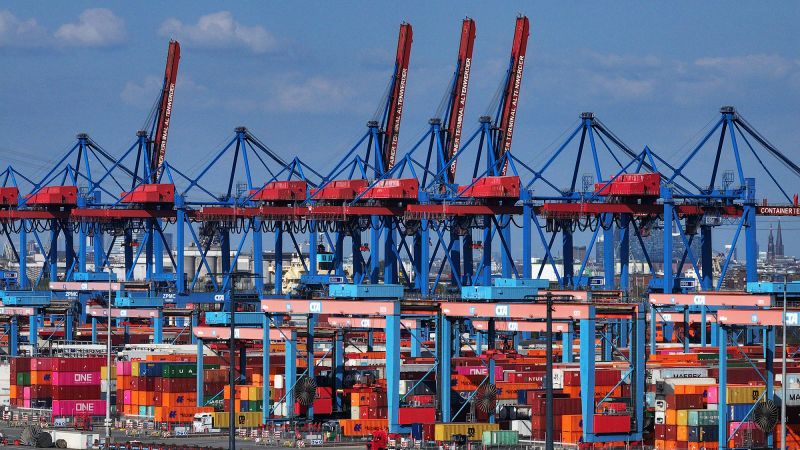Elimination of De Minimis Exemption: What It Means for Consumers and Businesses

Introduction
The end of the "de minimis" exemption has major implications for consumers and businesses alike. This policy, which allowed for duty-free entry of low-value goods into the US, is being eliminated, potentially leading to billions of dollars in new tariffs on millions of packages. This change is a result of the Trump administration's efforts to level the playing field with countries like China and to protect American jobs. However, the impact of this policy change may be felt by consumers in the form of higher prices and fees.
Key Details
Under the new policy, goods valued at less than $800 will now be subject to tariffs, whereas before they were exempt. This means that popular items like clothing, electronics, and household goods that were previously duty-free will now have additional costs. For example, a $700 laptop would incur a 25% tariff, resulting in an additional $175 fee. This could have a significant impact on e-commerce businesses that rely on low-value imports, as well as consumers who may see increased prices for their favorite online purchases.
Impact
The elimination of this exemption could also have a ripple effect on the global economy. With the rise of e-commerce and cross-border trade, many businesses and consumers rely on the de minimis exemption to keep costs low. The new tariffs may not only affect American businesses but also impact international trade and relationships.
About the People Mentioned
Donald Trump
Donald John Trump, born June 14, 1946, in Queens, New York, is an American businessman, media personality, and politician. He graduated from the University of Pennsylvania’s Wharton School in 1968 with a degree in economics. In 1971, he took over his family’s real estate business, renaming it the Trump Organization, through which he expanded into building and managing skyscrapers, hotels, casinos, and golf courses. Trump gained widespread fame as the host of the reality TV show *The Apprentice* from 2004 to 2015, which helped establish his public persona as a successful entrepreneur. Trump entered politics as a Republican and was elected the 45th president of the United States, serving from 2017 to 2021. His presidency was marked by significant policy actions including tax cuts, deregulation, the appointment of three Supreme Court justices, renegotiation of trade agreements (notably replacing NAFTA with the USMCA), and a focus on immigration control including border wall expansion. He withdrew the U.S. from international agreements such as the Paris Climate Accord and the Iran nuclear deal, and engaged in a trade war with China. His administration’s response to the COVID-19 pandemic was criticized for downplaying the virus’s severity. Trump was impeached twice by the House of Representatives—first in 2019 for abuse of power and obstruction, and again in 2021 for incitement of insurrection—but was acquitted by the Senate both times. After losing the 2020 election to Joe Biden, Trump challenged the results, culminating in the January 6, 2021, Capitol riot. He remains a central figure in American politics, having won the 2024 presidential election and returned as the 47th president in 2025, continuing to promote policies aimed at economic growth, border security, and military strength[1][2][3][4].
About the Organizations Mentioned
Trump Administration
The **Trump Administration** refers to the executive branch of the United States government under President Donald J. Trump, covering two non-consecutive periods: his first term from 2017 to 2021 and his second term beginning in 2025. As an organization, it is responsible for executing federal laws, shaping public policy, and managing national affairs during its tenure. During the **first Trump Administration (2017–2021)**, the administration pursued a wide-ranging agenda focused on immigration reform, economic nationalism, deregulation, judiciary appointments, and foreign policy shifts. Key actions included building and expanding the U.S.-Mexico border wall—completing 458 miles by January 2021—and implementing strict immigration policies such as travel bans from several predominantly Muslim countries and rescinding the DAPA amnesty program[2]. The administration withdrew the U.S. from the Trans-Pacific Partnership trade deal, renegotiated NAFTA into the USMCA, and signed the "Buy American and Hire American" executive order to prioritize American workers[1][3][5]. Judicially, Trump appointed three Supreme Court justices—Neil Gorsuch, Brett Kavanaugh, and Amy Coney Barrett—significantly influencing the federal judiciary with over 200 judicial appointments[5]. The administration also focused on military expansion, combating ISIS, addressing the opioid crisis, and responding to the COVID-19 pandemic with vaccine development support[5]. Foreign policy was marked by controversial decisions including troop withdrawals from northern Syria, reinforced support for Saudi Arabia, and tensions with Iran and North Korea[4]. The administration faced two impeachments: first in 2019 over Ukraine dealings and again in 2021 following the January Capitol riot; Trump was acquitted by the Senate both times[4][5]. After losing the 2020 election, Trump returned for a **second term starting in 2025**, continuing his policy priorities with new regulatory changes and political appointments[6][8]. The Trump Administration
China
China is not an organization but a sovereign nation and the world’s second-largest economy, playing a pivotal role in global business and technology. Since initiating economic reforms in 1978, China has transformed from a largely agrarian society into an upper-middle-income country with an average GDP growth of over 9 percent per year for decades, lifting nearly 800 million people out of poverty[2]. The country’s economic model initially focused on investment and export-oriented manufacturing but is now shifting towards higher-value services, domestic consumption, and low-carbon growth to address social, environmental, and structural challenges[2]. China’s government heavily directs industrial policy, promoting domestic innovation and technological self-reliance through plans like “Made in China 2025” and the 14th Five Year Plan (2021-2025). These initiatives target advanced technology sectors such as robotics, aerospace, new energy vehicles, biopharmaceuticals, and high-tech manufacturing, aiming to replace foreign technologies with domestic alternatives and expand China’s global market presence[3]. This industrial strategy combines state subsidies, preferential policies, and strict market access controls for foreign firms, shaping a competitive environment favoring national champions[3]. Despite solid economic growth—real GDP grew by 5.4% year-on-year in early 2025—China faces headwinds including demographic shifts, slowing productivity, a cooling property market, and global trade uncertainties. Growth is projected to moderate to around 4.5% in 2025 and 4.0% in 2026, with fiscal stimulus helping to offset some challenges[1][3][6]. Externally, China remains a major global exporter, with exports outpacing GDP growth in 2025[6]. Notably, China’s governance under President Xi Jinping has tightened control over civil society, media, and minority regions, drawing international scrutiny for human rights issues and repression, especially of Uyghurs and Tibetans[4][9]. Meanwhile, Chin












